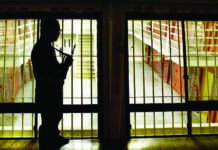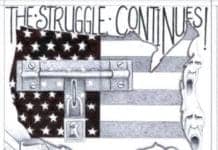
by Corene Kendrick, Prison Law Office Staff Attorney
On March 25, 2020, attorneys from the Prison Law Office and the law firm of Rosen, Bien, Galvan, and Grunfeld filed an emergency motion in the three-judge panel of the Coleman v. Newsom and Plata v. Newsom, the long-running California Department of Corrections and Rehabilitation (CDCR) prison overcrowding lawsuits, to order CDCR to immediately reduce the population of incarcerated people because of the unacceptable risk of harm from COVID-19.
The emergency motion asks that the federal court order CDCR to reduce the population density in crowded dorms and living spaces to a level that would allow social distancing by releasing to parole or post-release community supervision all people who are at low risk as determined by CDCR’s risk assessment instruments, or are serving a term for a non-violent offense or are paroling within the year.
The motion also asks that CDCR release or relocate all incarcerated people who are at high risk of COVID-19, including,
(a) people aged 65 and over;
(b) people with chronic lung disease or moderate to severe asthma;
(c) people who have severe heart conditions;
(d) people who are immunocompromised (for example, due to cancer treatment, bone marrow or organ transplantation, immune deficiencies, poorly controlled HIV or AIDS, or prolonged use of immune-weakening medications);
(e) people with severe obesity;
(f) people with uncontrolled diabetes;
(g) people with renal failure;
(h) people with liver disease; and
(i) people who are pregnant.
The emergency motion asks that the federal court order CDCR to reduce the population density in crowded dorms and living spaces to a level that would allow social distancing by releasing to parole or post-release community supervision all people who are at low risk as determined by CDCR’s risk assessment instruments, or are serving a term for a non-violent offense or are paroling within the year.
The attorneys asked that in the alternative, CDCR should be ordered to release to parole or post-release community supervision as many people as necessary to achieve safe social distancing and sufficient space for quarantines and isolation.
The motion relies upon the expert declarations of correctional experts who explained that the release of vulnerable populations – who are overwhelmingly older, seriously mentally ill, physically disabled, and/or chronically ill – presents little or no public safety risk of recidivism, as well as declarations from correctional medical and mental health experts who predicted that the failure to reduce the prison population would result in increased numbers of deaths.
Finally, the attorneys for the incarcerated people asked that the state of California submit its plan to implement these changes on or before April 1, 2020.
The attorneys for the prisoners submitted as evidence in support of their order numerous photos of the squalid and overcrowded conditions in which incarcerated people live in within the California prison system.
Prison Law Office Managing Attorney Sara Norman stated: “The CDCR prison system is far too crowded. The prisons house tens of thousands of people in crowded dormitories where they live, sleep and bathe within feet, sometimes inches – of each other. The prisons also house tens of thousands of the people most vulnerable to death or severe complications from COVID-19: the elderly and people with serious underlying medical conditions.
“These conditions pose an unacceptable risk of harm not only for people who live and work in CDCR, but also as well to the general public.”
The attorneys asked that the court expedite any legal briefing from the state and that the panel issue its decision as quickly as possible, given the urgency of the situation.
Resources
For more information, please contact Sara Norman, snorman@prisonlaw.com, or Michael Bien, mbien@rbgg.com.
All court filings are here: https://prisonlaw.com/news/cdcr-covid-19/ and will be updated as soon as practicable
Staff Attorney Corene Kendrick can be reached at Prison Law Office, 1917 Fifth St., Berkeley, CA 94710 or ckendrick@prisonlaw.com.

 Store
Store












